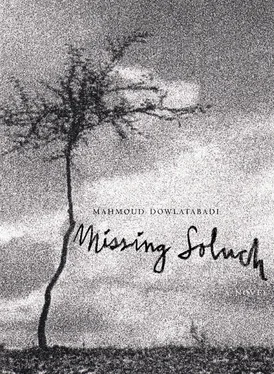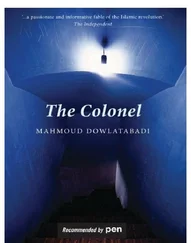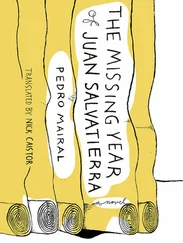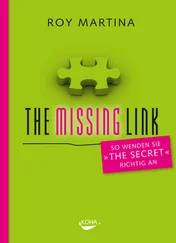“What?”
“If a man disappears himself in this way and is gone for several months — I don’t know how many exactly — and there’s no word from him, his wife is considered to have been divorced. Just as if a Muslim does not eat meat for forty days and nights he is considered an unbeliever! Did you know this? You’re a Muslim woman! A person without a spouse is cursed on the earth!”
Karbalai Doshanbeh had said his peace. He rose and said, “This is an important point, from religious law. So you should know about your own status and situation!”
Mergan looked at the broken frame of the old man in silence. Karbalai Doshanbeh led his lamb away and left. She stood quietly for a moment and then, as if something suddenly clicked in her head, she sharply returned to her work. She snapped at her daughter, “What are you doing just standing there? Pour water in the mud! Can’t you see the clay is drying?”
Hajer leapt back to work.
Once again, the mother and daughter were swept away by the work. But now a thorn had pierced Mergan’s heart. Her heart was burning. Karbalai Doshanbeh had released a bag of poison in Mergan’s heart and left.
Was it true, that Mergan was now single, and her marriage was invalid? Was Soluch no longer legally hers? Had Molla Aman brought untrue news of Soluch for his sister for this reason? These questions all mixed in her mind and made Mergan more and more anxious. Mergan had not taken this possibility into account. Could Soluch have divorced her with this silent act, just by leaving? Strange …! But why? Mergan wanted nothing from Soluch. So why had he not just divorced her by handing her a religious writ, as was legal? No, perhaps Karbalai Doshanbeh had made all of this up himself! It’s impossible. Mergan had to go in person and request a religious consultation. But what would people say? If Mergan went to request a decision for this question, the others in the village would say a thousand different things about her. It was impossible that they would not say, “The woman’s drunk! Her husband’s been gone for a short while to work and provide for her and their children, and she’s been possessed! What people you’ll find!”
And if they said this — which they certainly would — Mergan felt they would have a right to. After all, she would say the same thing were it another woman instead of her. Things like, “She’s scrambling around trying to find a legal justification for herself!”
But what would happen to Mergan? To her sons and daughter?
So she needed information. The matter needed illumination. Mergan had the right to be worried for herself. The only path she could imagine taking was to go late one night to see the Molla of Zaminej. But how? His wife would certainly find out, and as soon as she’d heard what questions she’d brought to him, it would be spread all across the town. Any gossip from the Molla’s wife’s mouth had an audience of a thousand ears. So what to do?
“Fill the cup with clay, girl!”
Mergan took the clay-filled cup from Hajer. She wiped clay over a spot under a high shelf and stepped back from her work. She still had to go to the house of Mirza Hassan, Agha Malak’s son-in-law, to do the same task there. She brought her implements out into the yard. She set out to wash up by the edge of a pit next to the olive tree. Hajer poured water onto her mother’s hands and then sat so her mother could do the same for her. Zahra came out of the kitchen and looked at Mergan from the corner of her eyes before calling, “Zabiholla told me to tell you to be sure to do two coats. You know he …”
Mergan picked up some of her tools and said, “Tell him I’ll send Abrau to come and collect the payment.”
She didn’t stick around for further conversation. She walked out the door and told her daughter to gather the remaining implements and to bring them.
* * *
In the house, bread and tea were consumed without a word. When dry bread is combined with water, it expands inside the stomach, and when combined with a hard day’s work, it brings on sleep. But Mergan couldn’t succumb to the heaviness of her eyelids. Before the exhaustion could set in, she rose and took her work tools and Hajer and headed to the house of Mirza Hassan.
They had just set the table and the fresh blood of a recently slaughtered lamb was still on the ground. Salar Abdullah, Zabihollah, and Mirza Hassan were sitting on a cloth out in the sun beside the yard pool while picking their teeth. Salar Abdullah was sitting with his back against the wall, leaning the back of his head against it. Although he was sitting on one knee, holding up his body with his left hand, he still looked taller than the others. Zabihollah, round and bruised-looking — not unlike his uncle Karbalai Doshanbeh — was sitting cross-legged by the throw-cloth, picking at the mud dried on the cuff of his trousers. Mirza Hassan, a petty landowner in Zaminej, had risen and was going to fetch a round of tea.
Mergan, observing tradition, offered her greetings to the men before heading to the room behind the porch.
Mirza Hassan had put colored glass in two of the small windows of the room. The room was already clean and didn’t need to be swept and washed down. Just a little water splashed on the walls would be enough. Hajer, as a student who has begun to master her lesson, went out to fill the water sack from the yard pool and brought it back. Mergan then began sprinkling the room with water.
“You’re working hard for the New Year’s season. Bravo, Auntie Mergan!”
It was the sound of Salar Abdullah. He was sweet-talking her from where he had been sitting. Mergan didn’t reply. From the moment when she learned that Zabihollah and Salar Abdullah and a couple of the others had designs on God’s Land, she couldn’t bear seeing any of them. She refused to look them in the face. But one has to separate the accounts between breadwinning and those reflecting personal preferences of good and bad in people. Sometimes, one has no choice but to accept work and pay from the devil himself. One can’t use the same hand to accept one’s wages and to ask for help. That’s just how things are. Despite this, Mergan didn’t have the heart to respond to Salar in a voice that feigned happiness. She didn’t see the need to.
Let him go to hell!
So she preoccupied herself with her work. After all, at this moment, Mergan wasn’t just a toy for Salar Abdullah!
Mergan had heard that Salar Abdullah had been speaking about buying a tractor. She had heard it said that Zabihollah and Mirza Hassan and Kadkhoda Norouz were all partners in this purchase. Then, talk of a water pump also arose, and of unifying different scraps of land into a single domain. Then, the gossip became complicated and Mergan couldn’t quite follow all of it. So, she let her imagination take over. Based on things Ali Genav had said, and what she had more or less heard from others in the village, Mergan pieced together that the larger landowners were now in a partnership. According to Ali Genav, the Kadkhoda’s interest in this was that in addition to what he already had, the parts of his farmland that would not be served by the water pump would be ploughed for two years by the communal tractor. But Mergan couldn’t really believe that this could all be possible.
Mirza Hassan’s voice rose.
“They’ve accepted the plan. Pistachio farming is a new trend across the country. If it catches on — and I hope it does — it’ll turn the whole nation around. On paper, after eight years, the harvests will have us richer than we’d ever dreamed.”
Mergan hadn’t known of these details. She had only heard that Ghodrat’s uncle had offered his land and, so they said, had received a promise that he would work minding the water pump. And Ghodrat’s father, who was heavily in debt to Kadkhoda Norouz, had come to an agreement as well. He bought his opium from him and so had been compelled to give up his land. But at this point, Salar Abdullah and his partners had not yet been able to make deals with many of the others, people like Mergan and Sanam’s sons, Morad and Asghar Ghazi.
Читать дальше












